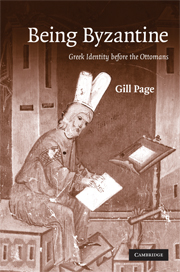Book contents
- Frontmatter
- Contents
- List of illustrations
- Acknowledgements
- A note on the use and transliteration of Greek
- Abbreviations
- Reference works
- Introduction: The Frankish conquest of Greece
- 1 Ethnic identity?
- 2 Byzantine identities
- 3 Niketas Choniates
- 4 The thirteenth century: ambition, euphoria and the loss of illusion
- 5 The nightmare of the fourteenth century
- 6 Meanwhile, a long way from Constantinople …
- 7 The long defeat
- 8 Roman identity and the response to the Franks
- Glossary
- Map 1 The Aegean region
- Map 2 The Peloponnese
- Appendix 1 Key content items
- Appendix 2 The origins of the Chronicle of the Morea
- Bibliography
- Index
8 - Roman identity and the response to the Franks
Published online by Cambridge University Press: 24 November 2009
- Frontmatter
- Contents
- List of illustrations
- Acknowledgements
- A note on the use and transliteration of Greek
- Abbreviations
- Reference works
- Introduction: The Frankish conquest of Greece
- 1 Ethnic identity?
- 2 Byzantine identities
- 3 Niketas Choniates
- 4 The thirteenth century: ambition, euphoria and the loss of illusion
- 5 The nightmare of the fourteenth century
- 6 Meanwhile, a long way from Constantinople …
- 7 The long defeat
- 8 Roman identity and the response to the Franks
- Glossary
- Map 1 The Aegean region
- Map 2 The Peloponnese
- Appendix 1 Key content items
- Appendix 2 The origins of the Chronicle of the Morea
- Bibliography
- Index
Summary
QUESTIONS …
This investigation began with a set of linked hypotheses. Centrally, it was proposed that the Frankish conquest and occupation constituted an event of extreme significance for the Byzantine Roman identity which brought about developments in the way the Romans viewed themselves. In detail, it was proposed that, in the period following 1204:
There was no single uniform sense of ethnic identity among the Romans (that is, the inhabitants of the territory under the rule of the emperor in Constantinople in the period preceding the conquest of 1204).
Ethnic identities among the Romans were not static during this period but developed in response to major political changes.
The phenomenon of Frankish conquest and rule was the single most critical impetus for developments in the ethnic identities of the Romans during this period.
The investigation began with a setting of the scene on the eve of the Frankish conquest of 1204. Firstly, the evidence revealed that it was permissible to speak of Roman ethnic identity at this time. The imperial Byzantine Roman identity was shown to be a group identity professed or implied by the individuals of the empire; this identity consisted of three major strands: the political, the religious and the cultural, all of which were seen to have a long history and to gain their validation from their age-old quality. There was a particularly strong contrast between the Roman and the non-Roman other, the barbarian.
- Type
- Chapter
- Information
- Being ByzantineGreek Identity Before the Ottomans, 1200–1420, pp. 267 - 281Publisher: Cambridge University PressPrint publication year: 2008



